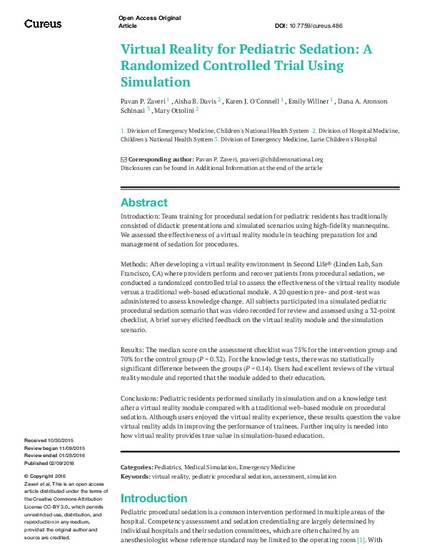
INTRODUCTION: Team training for procedural sedation for pediatric residents has traditionally consisted of didactic presentations and simulated scenarios using high-fidelity mannequins. We assessed the effectiveness of a virtual reality module in teaching preparation for and management of sedation for procedures.
METHODS: After developing a virtual reality environment in Second Life® (Linden Lab, San Francisco, CA) where providers perform and recover patients from procedural sedation, we conducted a randomized controlled trial to assess the effectiveness of the virtual reality module versus a traditional web-based educational module. A 20 question pre- and post-test was administered to assess knowledge change. All subjects participated in a simulated pediatric procedural sedation scenario that was video recorded for review and assessed using a 32-point checklist. A brief survey elicited feedback on the virtual reality module and the simulation scenario.
RESULTS: The median score on the assessment checklist was 75% for the intervention group and 70% for the control group (P = 0.32). For the knowledge tests, there was no statistically significant difference between the groups (P = 0.14). Users had excellent reviews of the virtual reality module and reported that the module added to their education.
CONCLUSIONS: Pediatric residents performed similarly in simulation and on a knowledge test after a virtual reality module compared with a traditional web-based module on procedural sedation. Although users enjoyed the virtual reality experience, these results question the value virtual reality adds in improving the performance of trainees. Further inquiry is needed into how virtual reality provides true value in simulation-based education.
Available at: http://works.bepress.com/mary-ottolini/7/

Reproduced with permission of Cureus.